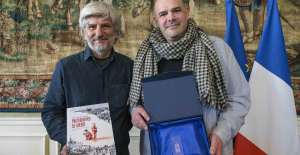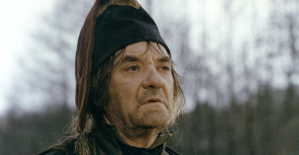Louis Antoine de Saint-Just was not even 27 years old when his head fell into the basket under the guillotine on 10 Thermidor of the year II (27 July 1794). But there was enough time for some to see it as a bright hope for a just social contract (according to the great historian Jules Michelet, 1798–1874). Others, on the other hand, see him as a pioneer of modern totalitarianism.
The fact that Saint-Just was able to play a leading role in the French Revolution for a year and a half was thanks to his impetuous nature, his uncompromising rhetoric and - last but not least - his youthful beauty, which distinguished him from the circle of older lawyers and publicists who organized the French National Convention coined. Jacques-Louis David, Jean-Baptiste Greuze and Pierre Paul Prud'hon contributed to it with their portraits. The malicious quip of the writer André Malraux that "the legend did not arise from the beauty of Saint-Just, but its beauty from the legend" has only one flaw. Artists knew the man they were painting and how their contemporaries saw him.
Born on August 25, 1767, the son of a captain not far from Nevers, Saint-Just received a middle-class education. In 1788 he completed his law studies in Reims. Armed with this knowledge, which also included knowledge of Roman and Greek classics, he set out in search of a job. Literary attempts such as the poem “Organt”, which promptly brought him into conflict with the censors, bear witness to this.
In July 1789, Saint-Just witnessed the storming of the Bastille in Paris - and decided to become a politician. His hometown of Blérancourt made him vice-commander of its National Guard. The 1791 election to the National Legislative Assembly was canceled on a technicality. A year later he entered the National Convention as a deputy for the department of Aisne. There he initially did not join any party, but voted repeatedly with the Jacobins.
Their radicalism left a lasting impression on him. This was demonstrated by Saint-Just's first major appearance at the trial of Louis XVI: “I say that the king must be treated as an enemy; we have less to condemn than to fight... What relationship of justice could there be between mankind and a king?" He concluded: "Caesar was sacrificed in the midst of the Senate, and the whole formality was only 23 stabs in the back. It was done under no other law than in the name of the liberty of Rome.”
The plea for regicide in the name of liberty bridged the gap to the other radical actor who had previously appeared “like a god” to Saint-Just: Maximilien de Robespierre. Both succeeded in convincing the procrastinating convention of the death sentence on the fallen king. This sealed their pact. By the 10th Thermidor II, Robespierre was the leading politician of the revolution, Saint-Just its terrible messenger of death and executor.
The foundation of their pact became the utopia of a virtuous society, whose dazzling image was composed of fragments of ancient classics, the works of Jean-Jacques Rousseau and revolutionary debates of the present. All good citizens who, like Caesar's murderers, were willing to give their lives for the good of the community were considered virtuous.
However, anyone who allowed themselves to be guided by their own interests, such as economic ones, became traitors. "I regard wealth not only as the reward of crime, but as the punishment for crime, and I want to remain poor so as not to become unhappy," Saint-Just explained to his bourgeois peers. In order not to leave the state and society to their selfishness, a strong government is needed. It would ensure the equality of all citizens by subjecting even social contacts to its control.
The consequence of these thoughts did not shape the draft constitution, which came about with the significant participation of Saint-Just in 1793 and was also accepted by the convention, but never came into force due to the dramatic state crisis caused by invasions, uprisings and economic collapse. Instead, Saint-Just, the man to whom the preceding catalog of human rights was based, turned into a fanatical supporter of a virtuous dictatorship. With Robespierre and Georges Couthon, he formed the radical nucleus of the Welfare Committee that took on the task of saving the revolution in 1793.
Saint-Just was given the task of reorganizing the retreating armies in Alsace and the North and driving their generals to victory. For this he had a number of officers shot, improved supplies with special taxes for the wealthy and morale with pithy words ("The Republic takes from its opponents and only supplies its opponents with lead"). He did not shy away from going into battle himself and providing the soldiers of the "Levée en masse" with examples of his personal courage.
In Paris, Saint-Just gave his full support to Robespierre, who turned the welfare committee into an instrument of terror in September 1793. From then on, the panel appointed the judges and jury of the Revolutionary Tribunal. Trials could be concluded after three days if the jury found "that their conscience was sufficiently enlightened". That was enough to send the domestic opponents, both the radicals around Jacques-René Hébert and the moderates around Georges Danton, to the guillotine.
But since even that was apparently not enough to charge all citizens with sufficient virtue, the terror was intensified again in June 1794. Now everyone could expect to be a passenger on the Death Wagon. "You have to reduce the number of civil servants everywhere so that the highest officials can also work," Saint-Just explained, and suggested confiscating the goods of the "conspirators" and distributing them to the poor, because "they are the real powerful in the world World".
But this radical program provoked opposition, not only in the Convention but even in the Welfare Committee. When Saint-Just suggested that prison inmates awaiting trial and execution be made slave laborers, he was met with an icy silence. Then someone had finally left the base of the bourgeois revolution, which had long since become fragile. The total subjection of the individual to the power of the state was to become a characteristic of twentieth-century regimes. In the wispy world of ideas of a Saint-Just, however, such an idea could already take shape. (Michelet's judgment quoted at the beginning can also be explained by the luck of his early birth).
When Robespierre, on 8 Thermidor (July 26, 1794), after a month of silence in the convent, indulged in obscure hints about further punishments for those who had neglected their duty, a conspiracy was formed immediately. The following day Saint-Just and Robespierre were prevented from speaking and arrested. Although they were freed again in the evening, they had no plan how to confront their opponents. Robespierre was injured when he was arrested again and Saint-Just is said to have caught him. Both ended a few hours later with 20 followers under the guillotine.
You can also find "World History" on Facebook. We are happy about a like.

 B:SM will break its investment record this year with 62 million euros
B:SM will break its investment record this year with 62 million euros War in Ukraine: when kyiv attacks Russia with inflatable balloons loaded with explosives
War in Ukraine: when kyiv attacks Russia with inflatable balloons loaded with explosives United States: divided on the question of presidential immunity, the Supreme Court offers respite to Trump
United States: divided on the question of presidential immunity, the Supreme Court offers respite to Trump Maurizio Molinari: “the Scurati affair, a European injury”
Maurizio Molinari: “the Scurati affair, a European injury” Beware of the three main sources of poisoning in children
Beware of the three main sources of poisoning in children First three cases of “native” cholera confirmed in Mayotte
First three cases of “native” cholera confirmed in Mayotte Meningitis: compulsory vaccination for babies will be extended in 2025
Meningitis: compulsory vaccination for babies will be extended in 2025 Spain is the country in the European Union with the most overqualified workers for their jobs
Spain is the country in the European Union with the most overqualified workers for their jobs In the United States, a Boeing 767 loses its emergency slide shortly after takeoff
In the United States, a Boeing 767 loses its emergency slide shortly after takeoff The A13 motorway will not reopen on May 1
The A13 motorway will not reopen on May 1 More than 1,500 items for less than 1 euro: the Dutch discounter Action opens a third store in Paris
More than 1,500 items for less than 1 euro: the Dutch discounter Action opens a third store in Paris 100 million euros in loans, water storage, Ecophyto plan… New measures from the executive towards farmers
100 million euros in loans, water storage, Ecophyto plan… New measures from the executive towards farmers New York justice returns 30 works of art looted from Cambodia and Indonesia
New York justice returns 30 works of art looted from Cambodia and Indonesia Les Galons de la BD dedicates War Photographers, a virtuoso album on the Spanish War
Les Galons de la BD dedicates War Photographers, a virtuoso album on the Spanish War Theater: Kevin, or the example of an academic failure
Theater: Kevin, or the example of an academic failure The eye of the INA: Jean Carmet, the thirst for life of a great actor
The eye of the INA: Jean Carmet, the thirst for life of a great actor Skoda Kodiaq 2024: a 'beast' plug-in hybrid SUV
Skoda Kodiaq 2024: a 'beast' plug-in hybrid SUV Tesla launches a new Model Y with 600 km of autonomy at a "more accessible price"
Tesla launches a new Model Y with 600 km of autonomy at a "more accessible price" The 10 best-selling cars in March 2024 in Spain: sales fall due to Easter
The 10 best-selling cars in March 2024 in Spain: sales fall due to Easter A private jet company buys more than 100 flying cars
A private jet company buys more than 100 flying cars This is how housing prices have changed in Spain in the last decade
This is how housing prices have changed in Spain in the last decade The home mortgage firm drops 10% in January and interest soars to 3.46%
The home mortgage firm drops 10% in January and interest soars to 3.46% The jewel of the Rocío de Nagüeles urbanization: a dream villa in Marbella
The jewel of the Rocío de Nagüeles urbanization: a dream villa in Marbella Rental prices grow by 7.3% in February: where does it go up and where does it go down?
Rental prices grow by 7.3% in February: where does it go up and where does it go down? Even on a mission for NATO, the Charles-de-Gaulle remains under French control, Lecornu responds to Mélenchon
Even on a mission for NATO, the Charles-de-Gaulle remains under French control, Lecornu responds to Mélenchon “Deadly Europe”, “economic decline”, immigration… What to remember from Emmanuel Macron’s speech at the Sorbonne
“Deadly Europe”, “economic decline”, immigration… What to remember from Emmanuel Macron’s speech at the Sorbonne Sale of Biogaran: The Republicans write to Emmanuel Macron
Sale of Biogaran: The Republicans write to Emmanuel Macron Europeans: “All those who claim that we don’t need Europe are liars”, criticizes Bayrou
Europeans: “All those who claim that we don’t need Europe are liars”, criticizes Bayrou These French cities that will boycott the World Cup in Qatar
These French cities that will boycott the World Cup in Qatar Tennis: “I need to regain confidence in my body,” explains Rafael Nadal
Tennis: “I need to regain confidence in my body,” explains Rafael Nadal NBA: Orlando returns to level with Cleveland in the 1st round of the play-offs
NBA: Orlando returns to level with Cleveland in the 1st round of the play-offs Tennis: Iga Swiatek in the round of 16 at full speed
Tennis: Iga Swiatek in the round of 16 at full speed “It was exceptional here in Chaban-Delmas”: Escudero looks back on the excitement around France-England
“It was exceptional here in Chaban-Delmas”: Escudero looks back on the excitement around France-England

















